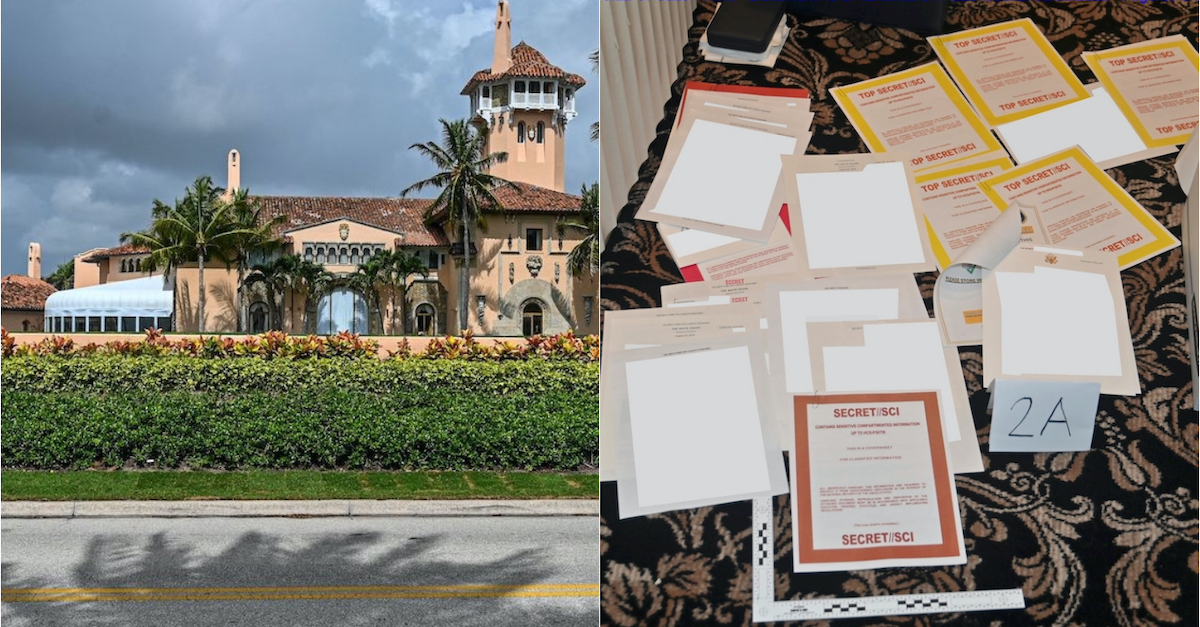
On the left, former President Donald Trump’s residence at Mar-A-Lago is pictured on Aug. 9, 2022. The photo on the right shows the highly classified documents that the FBI found inside Trump’s office. (Photo of Mar-a-Lago by Giorgio Viera/AFP via Getty Images; classified documents found in the search via DOJ)
The FBI found dozens empty folders with “Classified” banners during their search of Donald Trump’s home at Mar-a-Lago, a more detailed property receipt from the search released on Friday reveals.
The 8-page property receipt, still describing the documents in broad strokes, adds a layer of mystery about what happened to the more than 100 classified documents that authorized seized from Trump’s primary residence in August.
According to the property receipt, one box contained 43 empty folders with “CLASSIFIED” banners and 28 empty folders labeled “Return to Staff Secretary/Military Aide.” Another box found in the storage room contained two empty folders with “CLASSIFIED” banners and two empty folders marked “Return to Staff Secretary/Military Aide.” A storage room box marked “Item 25” also contained an empty folder with a “CLASSIFIED” banner,” and yet another marked “Item 33” contained two empty folders with “CLASSIFIED” banners and another two marked “Return to Staff Secretary/Military Aide.”
Law&Crime’s analysis of the data from the more detailed property receipt indicates that authorities recovered more than 11,000 government documents without classification markings from Mar-a-Lago. In addition, the FBI found at least documents with 18 Top Secret markings, 54 with Secret markings, and 31 with confidential markings.
At least 48 empty folders had “CLASSIFIED” banners and 42 empty folders were marked “Return to Staff Secretary/Military Aide.”
The statutes cited by the government in their search warrant, including the Espionage Act, do not turn on the classification of the seized government files.
“Certainly Sloppy”
Former federal prosecutors who reviewed the more detailed property receipt injected a note of caution given the limited information.
“It’s kind of hard to know what to make of it because those folders are usually utilized when documents are being transported outside of a SCIF,” said CNN legal analyst Jennifer Rodgers, referring to the “Sensitive Compartmented Information Facility” where classified documents are usually stored.
The folders, she noted, was simply for transporting the documents.
“So the fact that there are empty ones, it means again that the handling of these documents was certainly sloppy,” added Rodgers, who formerly spent more than a decade as a prosecutor inside the Southern District of New York.
Asked whether the empty folders indicates files may have been shared, transferred or lost, fellow former federal prosecutor Renato Mariotti replied: “Possibly,” but he warned against too much speculation.
“I worry about reaching strong conclusions when we know so little,” Mariotti told Law&Crime. “Could just reflect how sloppy he handled classified material.”
Both Rodgers and Mariotti repeatedly used the word “sloppy” — at one point, Rodgers added the word “egregiously” — to describe the handling of the documents as reflected by the property receipt. The two experts noted that Trump’s personal property appeared to be commingled with classified or government documents.
“You’ll see classified Top Secret documents in the same container with non-classified, non-U.S. documents, like magazine articles, books, clothing, gift items, and the like, all kind of jumbled together, which, of course, is an egregious violation of the protocols for handling classified information,” Rodgers noted.
Law&Crime’s analysis of the data indicates that the government found more than 1,600 press clippings, 33 books and 19 items of clothing or gifts among the seized items, largely interspersed in boxes or containers among government documents.
“Not a Single Investigative Step”
Unsealed along with the more expansive property receipt is a three-page notice from prosecutors emphasizing the importance of reviewing the seized items to their “active criminal investigation.”
“The seized materials will continue to be used to further the government’s investigation, and the investigative team will continue to use and evaluate the seized materials as it takes further investigative steps, such as through additional witness interviews and grand jury practice,” the notice reads.
“Additionally, all evidence pertaining to the seized items — including, but not limited to, the nature and manner in which they were stored, as well as any evidence with respect to particular documents or items of interest — will inform the government’s investigation,” it continues. “Thus, it is important to note, ‘review’ of the seized materials is not a single investigative step but an ongoing process in this active criminal investigation.”
On Thursday, U.S. District Judge Aileen Cannon — a Trump appointee — reportedly indicated at a hearing that she was likely to appoint a special master to assess any matters of privilege that may arise from the seized documents. Prosecutors strongly urged her against that outcome, emphasizing that any delay could harm their investigation.
For Rodgers, the notice accompanying the more detailed property receipt underlined that messaging.
“I think what they’re trying to do with that is highlight to this judge that there is harm to the government by appointing a special master — and that’s that she would be setting back an active ongoing, serious criminal investigation,” Rodgers said.
Judge Cannon has not yet released her ruling by press time.
Update—Sept. 2, 2022 at 1:16 p.m. Eastern Time: This story has been updated to include Law&Crime’s analysis of the data revealed by the more detailed property receipt.
Read the more detailed property receipt, below:
Have a tip we should know? [email protected]